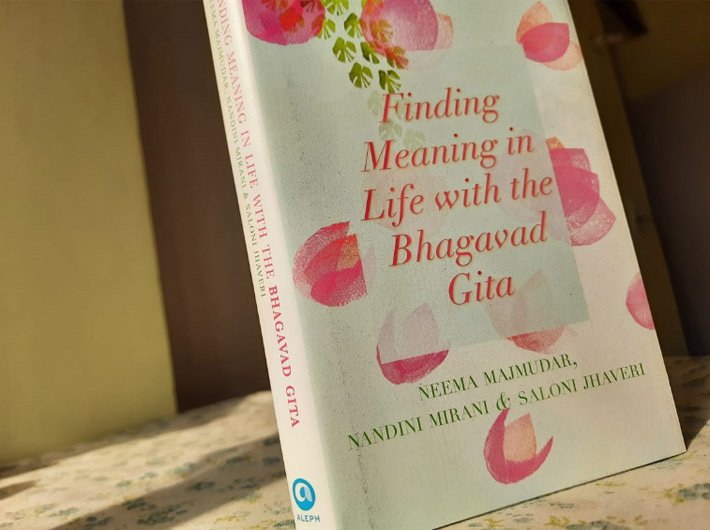Pandemics or no pandemics, perennial wisdom of this sacred text remains helpful to all, as this beautiful primer shows
Finding Meaning in Life with the Bhagavad Gita
By Neema Majumdar, Nandini Mirani & Saloni Jhaveri
Aleph, xv+152 pages, Rs 399
Neema Majumdar, Nandini Mirani and Saloni Jhaveri, all with degrees from world-class institutions and careers to match, turned to Advaita Vedanta to find meaning of life. Their first collaboration, Finding Meaning in Life with the Bhagavad Gita (Aleph), is worth reading more than once. Illustrations by Anne Loeper add to the beauty of this slim volume. Before discussing the book, a bit of backgrounder will be in order.
There are times when we feel baffled. We badly need a user’s manual for life, helpful direction from the Maker. Scriptures are around to answer to precisely that need, giving the faithful the word from above. The Bhagavad Gita is framed as a dialogue between Lord Krishna and Arjuna, who stands for all of us who are confused, depressed or plain lost. Mahatma Gandhi repeatedly spoke of the Gita as ‘mother’ and a ‘spiritual diagnostic system’ to which he turned whenever in doubt. (He also translated it into Gujarati.) Philosophers and psychologists have corroborated many of its advices – sometimes without realizing it.
What is arguably unique about the Gita is that it does not go by what is called in corporate jargon the one-size-fits-all approach. It appreciates differences among seekers and provides ‘adhikar bhede upadesh’, or advice according to one’s spiritual qualification. Its preaching, talking of Bhakti Yoga here and Karma Yoga or Gyan Yoga there, confounds the uninitiated. Under the right guidance, however, the apparently mutually exclusive paths turn out to be the guideposts depending on one’s preparedness as well as personal disposition. An emotional personality, for example, can prefer the Way of Faith, whereas an overactive person with busy social life would make a lot of progress on the Way of Karma.
The multilayered richness of the Gita, apart from its centrality to Hinduism especially in modern times, has attracted a high number of commentators. They are continuing an ancient tradition, which proposed a prasthantrayi, [https://en.wikipedia.org/wiki/Prasthanatrayi] three source texts. Various schools had to interpret them to prove their position – Upanishads, Brahmasutra and Bhagavad Gita. Thus, different schools of Vedanta have interpreted the Gita in the light of their own dogmas. Adi Shankaracharya’s reading of the Gita, in support of his Advaita Vedanta, is one of the many interpretations of this sacred text but remains the most influential.
In modern times, Advaita Vedanta has been made accessible to us all by the untiring efforts of many saints and their organisations, noteworthy among them are Ramakrishna Mission and Chinmaya Mission. Swami Chinmayananda Saraswati promoted a formal, structured learning of Advaita Vedanta texts, and among those who helped him in the process was Swami Dayananda Saraswati who later founded Arsha Vidya Gurukulam. A brilliant mind with enviable command over Sanskrit and English, his ‘The Teaching of the Bhagavad Gita’ has proved to be the lodestar for many seekers. Swami Dayananda also trained a batch of exceptional disciples (two of whom, Swami Viditatmananda Saraswati and Swami Tadrupananda, have been popular for their discourses on Vedanta in Gujarati).
Majumdar was fortunate enough to learn Sanskrit, the Upanishads and the Gita with Swami Dayananda Saraswati. “Listening to his teaching of the Gita slowly transformed my whole being,” she writes. Mirani and Jhaveri, in turn, have studied the scripture under Majumdar’s guidance. Loeper too is “deeply inspired by Neema’s wisdom and culture”. Their joint work aims to distil “the essence of the Gita to help us address the larger challenges of life that we have little control over, such as pandemics, wars, and economic crises, as well as concerns that are unique to each one of us—the search for meaning in our daily existence, success in our careers, happiness in personal lives, and also our longing for fulfilment”.
Most books about the Gita tackles the entire text, while the trio here has picked 45 verses, reminiscent of a selection Ramana Maharshi made of 42 verses. Majumdar, Mirani and Jhaveri have divided the book in five sections – Vision, Action, Cause, Growth, and Knowledge, and each small chapter explains one or two of the selected verses, beginning with the original verses (thankfully in Devanagari script). Written in a way that touches heart as well as head, this book will help you more and more with every careful rereading.

